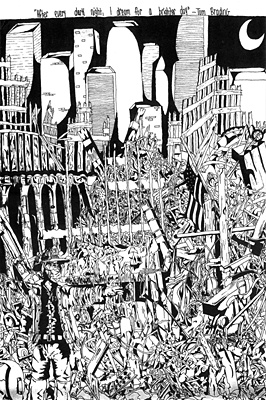All Nonfiction
- Bullying
- Books
- Academic
- Author Interviews
- Celebrity interviews
- College Articles
- College Essays
- Educator of the Year
- Heroes
- Interviews
- Memoir
- Personal Experience
- Sports
- Travel & Culture
All Opinions
- Bullying
- Current Events / Politics
- Discrimination
- Drugs / Alcohol / Smoking
- Entertainment / Celebrities
- Environment
- Love / Relationships
- Movies / Music / TV
- Pop Culture / Trends
- School / College
- Social Issues / Civics
- Spirituality / Religion
- Sports / Hobbies
All Hot Topics
- Bullying
- Community Service
- Environment
- Health
- Letters to the Editor
- Pride & Prejudice
- What Matters
- Back
Summer Guide
- Program Links
- Program Reviews
- Back
College Guide
- College Links
- College Reviews
- College Essays
- College Articles
- Back
Could Our Mind Be Our Worst Enemy?
It was an ordinary day, I came to 6th period band where I sat next to one of my close friends. As we started to play I noticed old and fresh scars on her arm. “What's that?” I asked suspiciously.
“Oh um, it's nothing.” she said trying to cover it up.
“Are you hurting yourself?” I replied demanding an answer.
“Yeah, you didn’t know?”
Teens don’t realize how much self-harming is negatively affecting their lives. Like the types of emotions that are going through their head, how they harm themselves and where, and signs of self harming.
Lots of different emotions are going through teens heads while they are self harming (cutting or burning). A teen has a better chance of self harming if they have a friend that does it or has done it before. They may be trying to cope with emotional pain, trying to reduce stress or anxiety, self hatred, or even punishing themselves. Serotonin is a brain chemical involved in controlling a person's mood. When teens self harm those chemicals are released in the brain which makes the teen feel more tranquil, but the relief is shortly followed by other feelings such as shame or embarrassment. This is mainly why self harm can become addictive. A cycle may be brought to the table. From calmness to guilt to cutting again to maintain that guilt. (“Self-Harm and Primary School Children Video Transcript”) Although most people when they hear self harm think of cutting, but that's not the only way teens harm themselves.
There's more than just one way teens self harm. If somebody mentioned to you something about self harming you’d probably think of cutting. Usual places of the body where cutting or self harm may occur is on the wrists, arms, thighs, chest, and legs. But there are more ways than you may think. Some teens, mostly girls will pull strands of hair off their head. They even use hot knives. If you take a knife and heat it with a lighter then put it on your skin it’ll burn you, or they may go as far as to cutting with it. Teens will sometimes even just burn themselves with matches. More ways include hitting yourself or punching walls, sticking things into your skin, preventing scars from healing, and swallowing inappropriate objects. (“Symptoms and Causes - Self-Injury/cutting - Mayo Clinic”) Although seeing scars is one symptom of self harm, there are other things to look out for.
There are more signs out there than you would think. Such as the obvious one: unexplained wounds, but teens in some cases will wear long sleeved shirts and pants to cover them up, even in hot weather. They could also be recklessly driving, binge drinking, taking too many drugs, and even unprotected sex. Some teens are so messed up in the head that they might even ask continual questions like “who am I ?” and “where am I?” (“Cutting and Self-Harm: How to Feel Better without Hurting Yourself”). People think that just because teens self harm that means they’re suicidal too, but that is not true. They don't want to kill themselves they want to feel something. In a transcript a teen said, “it's a way to have control over my body because I can't control anything else in my life.” Helping teens stop can be both complicated and stressful but in the end it will be worth it.
For the most part going through emotional pain is different for everybody. Whether it's what their thinking, the way they do it, and the signs of self harm. If you know or think anybody is self harming then you could try to encourage them that they shouldn't be ashamed, and suggest that they look out for treatment. Or even help them to find treatment. Don’t be over offensive and make them feel worse than they already do, because it takes more than just wanting to quit to actually quit.
“Cutting and Self-Harm: How to Feel Better without Hurting Yourself.” N.p., n.d. Web. 23 Sept. 2016.
News, Bbc. “Self-Harm Hospital Admissions among Children ‘at Five-Year High’ - BBC News.” BBC News. N.p., n.d. Web. 30 Sept. 2016.
“Self-Harm and Primary School Children Video Transcript.” KidsMatter. N.p., n.d. Web. 23 Sept. 2016.
“Symptoms and Causes - Self-Injury/cutting - Mayo Clinic.” N.p., n.d. Web. 23 Sept. 2016.

Similar Articles
JOIN THE DISCUSSION
This article has 0 comments.
